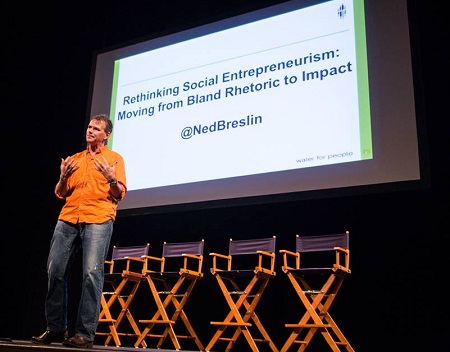‘A Meeting of Minds’: World’s largest global health and social entrepreneurship conference set for April
“The Unite For Sight Conference continues to be one of the most well-run conferences I’ve attended,” says Tricia Morente, strategic advisor of LifeSpring Hospitals and COO of Kangu. “Each year, I’m impressed by the caliber and number of speakers and attendees doing work on the ground. It’s not only a great forum for pushing thinking at an intellectual level, but there are also multiple opportunities for hands-on work as well. For instance, last year I was involved in a design workshop where we worked on real-time challenges my organization faced.”
Morente will be among the hundreds of expert speakers at the upcoming 11th annual Global Health & Innovation Conference at Yale University on April 12-13.
The Global Health & Innovation Conference, which has been hailed by CNN as “a meeting of minds,” is the world’s largest global health and social entrepreneurship conference. Each year, the conference draws more than 2,200 participants from all 50 states and from over 50 countries. Participants have the opportunity to learn from speakers on a broad range of topics, including social entrepreneurship, social businesses, business in global health, design thinking, maternal and child health, and non-communicable diseases, among many others.
The conference will feature keynote addresses by Arlene Blum of the Green Science Policy Institute; Seth Godin, blogger, author and founder of Squidoo.com; Gary Hirshberg of Stonyfield Farms; Michael Moss, an investigative reporter with The New York Times; Jeffrey Sachs, economist at the Earth Institute at Columbia University; and Sonia Ehrlich Sachs of the Millennium Villages Project.

Following the keynote addresses on the mornings of April 12 and 13, the Global Health & Innovation Conference will present more than 70 sessions, and each offers attendees an opportunity to learn from expert speakers on a variety of topics. Conference participants are challenged to think outside of their areas of focus and learn about effective strategies being applied across all fields of global health, social entrepreneurship and international development.
Left: Ned Breslin of Water For People discussess social entrepreneurship.
Session themes range from “Social Media and Health Education” and “Design Thinking in Global Health,” to “Impact Investing and Social Change” and “Global Health Ethics and Effectiveness.” Additionally, the conference annually includes unique social enterprise pitch sessions, which are presentations about innovative programs and organizations that are still in development. The presenters receive feedback on their up-and-coming entrepreneurial ventures and they also have an important opportunity to network and to further advance their ideas.
New to the conference this year are social enterprise lab sessions, where select social enterprises will present their pitches in front of both expert speakers and the conference audience. The expert speakers will then engage on stage in a 20-minute conversation with each pitch presenter, offering insight, guidance and advice, and answering the questions of each pitch presenter. The social enterprise lab presenters are selected by review of video submissions about their idea, organization or program.
The Global Health & Innovation Conference is highly focused on best practices in global health, social entrepreneurship and international development. All presentation abstracts are thoroughly vetted and evaluated by the conference committee to ensure that every presentation promotes only best practices in the field, has quality and relevant data, is based on evidence, and has metrics in place for outcome evaluation.
The conference, like Unite For Sight’s health care delivery programs in Ghana, Honduras and India, focuses on the importance of outcomes rather than outputs. For instance, Unite For Sight’s website specifies that 74,226 sight-restoring surgeries have been provided and supported to date. While some organizations count only the number of surgeries completed, Unite For Sight analyzes data on all patient outcomes to ensure that surgeries are, indeed, high-quality and sight-restoring. Similarly, speakers at the conference are instructed to tailor their presentations to highlight relevant and measurable outcomes.
This year, Unite For Sight will additionally hold a post-conference Innovation Summit on Monday, April 14. The summit will draw global health and social entrepreneurship professionals and students for a focused, highly interactive and collaborative summit on best and emerging strategies for effective health programs. Gary Cohen, president and co-founder of Health Care Without Harm, will give the keynote address, and other speakers include Jon Shaffer of Partners in Health, Tricia Morente of Kangu and Carol Dahl of The Lemelson Foundation.
In addition to the Global Health & Innovation Conference and the subsequent summit, Unite For Sight will also host its inaugural Innovator’s Forum on March 14. The forum will include presentations and meal receptions, and expert speakers will offer key lessons, mentoring and guidance about strategies that participants can apply to their work in the field. Keynote addresses will be presented by Gene Falk, co-founder and CEO emeritus, mothers2mothers; Victoria Hale, founder and CEO, Medicines360; and Ana Rowena McCullough, co-founder and CEO, QuestBridge.
All of these events promise to deliver insightful, relevant and ground-breaking presentations on best practices in global health, entrepreneurship and innovation. Anyone is welcome to register. For more information on the Global Health & Innovation Conference, visit this site. Check out this site for more about the Innovator’s Forum in March.
Jennifer Staple-Clark founded Unite For Sight in her Yale University dorm room in 2000, when she was a sophomore.
- Categories
- Education, Health Care, Social Enterprise
